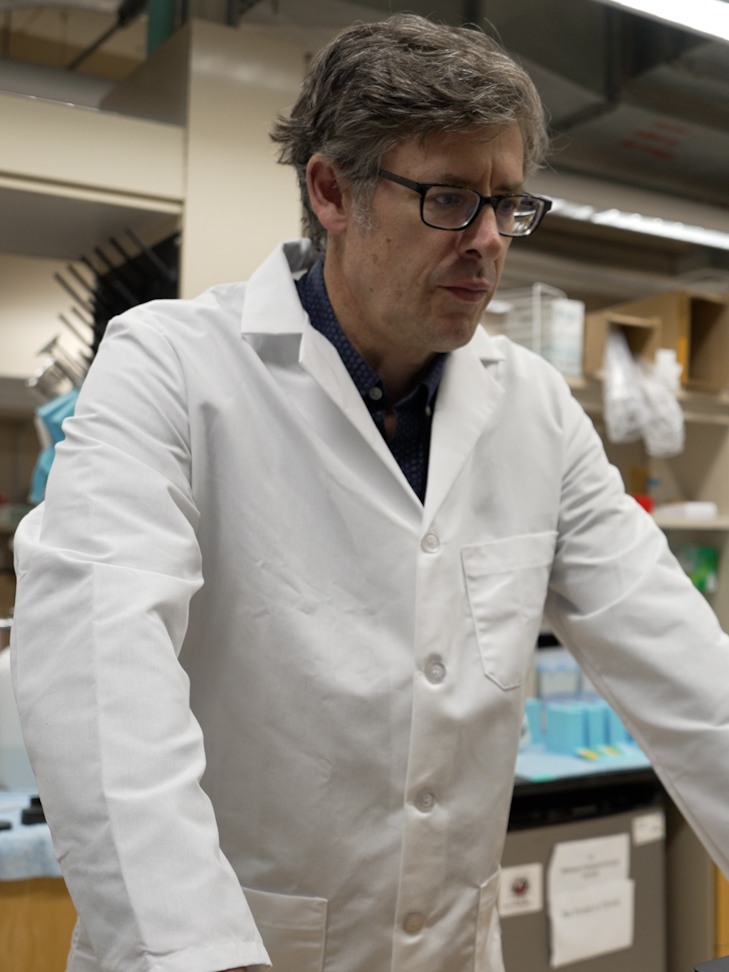The standard of care for brain cancer was established in 2005 and has remained essentially unchanged for nearly 20 years. Patients with glioblastoma, the most aggressive kind of brain cancer, live approximately one year, making brain cancer research an area of tremendous need. This need is what drives the work of Associate Professor Sean Lawler who leads the Brain Cancer Therapy Lab in Brown’s Legorreta Cancer Center.
Turning the body into a cancer hunter
At Brown’s Legorreta Cancer Center, Dr. Sean Lawler and his team of researchers are exploring a new treatment for cancer that uses the body’s own immune system to target brain tumors.
Dr. Sean Lawler is looking beyond traditional chemotherapy and radiation to drive new immunotherapy research in treating aggressive brain tumors.
Unlocking the potential of immunotherapy
In the last decade, there's been an emergence of a new type of treatment called immunotherapy, where scientists have been able to train a patient's immune system to recognize—and ideally target—cancer within the body. “This can be extremely effective,” says Lawler, “but only in a subset of tumors and specific tumor types, and generally not in the brain. Those tumors are very difficult.”
Lawler acknowledges that there are a lot of things researchers still need to understand about how immunology works in the brain, but if a patient's immune system can learn to recognize a tumor, it is possible that it can learn to eliminate it. With that in mind, one of his focus areas is to understand whether or not they can manipulate or “train” the brain tumor micro environment. Meaning the tumor cells, and all the other cells around it.
“If we can try and train the immune system using various approaches,” says Lawler, “we can then try and target these tumors in a new way.”
Unlike chemotherapy and radiation, the most common treatments which directly attack and kill cancer cells, immunotherapy harnesses the body’s own immune system to attack the tumor. In theory, this targeted approach could mitigate damage to healthy, noncancerous cells and result in fewer side effects. For Lawler, if such approaches could be applied effectively to brain tumors, it would “be an unprecedented breakthrough.”
Brown is fertile ground
Lawler came to Brown in 2021, drawn to the University’s supportive atmosphere and strategic partnerships. He describes Brown as “the ideal place” to pursue translational efforts, leverage his work, and keep the research dynamic.
“It's a very exciting time to do science in terms of reaching out to people,” says Lawler, like making connections within neuroscience, immunology, and bioengineering. “We're creating an ecosystem.”
If we can try and train the immune system using various approaches, we can then try and target these tumors in a new way.

Another important part of the environment beyond the faculty is the opportunity to train students. “Brown has a reputation for excellence in education,” says Lawler. “Undergraduate and medical students ask different kinds of questions than more senior scientists, and those questions can be really interesting because they're coming from a different perspective. I love the energy.”
Lawler is also confident that developing a strong cancer base at Brown will help the people of Rhode Island receive better care, and that those developments can have a meaningful ripple effect—especially when it comes to the development of clinical trials.
“Building innovative trials is an important aspect of building a cancer center,” says Lawler. “It will help local patients first, and then that work can be translated for the broader national and global stage.”
Support faculty.
Give now to support faculty and clinicians who are engaged in finding novel treatments and cures for all types of cancer.
For more information about how to support BioMed faculty, please contact
Cailie Burns
Associate Dean of Biomedical Advancement
+1 (401) 368-8155